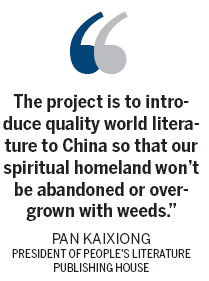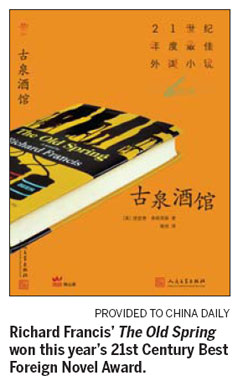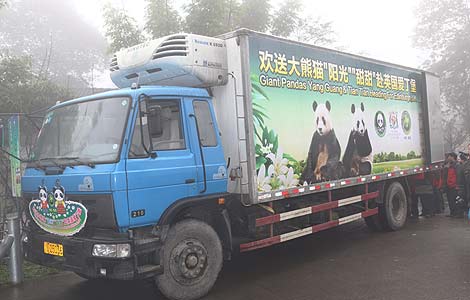China gives its judgment on foreign literature
Updated: 2011-12-09 11:11
(China Daily)
|
|||||||||
 |
British writer Richard Francis, French writer Jean-Christophe Rufin and Russian writer Olga Slavnikova were in Beijing recently to receive the 21st Century Best Foreign Novel of the Year Award. They also attended a series of events celebrating the 10-year anniversary of the award's inauguration.
Francis won this year's award with The Old Spring, which narrates a day in a pub in the south of England. Rufin's Katiba is an adventure story centering on terrorism. Slavnikova's Light Head tells the story of how a businessman safeguards his freedom when confronted with absurd treatment.
The award was initiated by People's Literature Publishing House and China Foreign Literature Association in 2001, to honor and introduce to Chinese readers the latest quality foreign literature. During the past decade, 62 novels in eight languages from 19 countries have been translated and published in the series.
Wu Yuetian, French literature researcher and director of the French Literature Screening Committee of the award, says the award is significant in the history of introducing foreign literature to China.
"We are no longer satisfied with merely translating foreign novels anymore," he says.
 |
"The award-winning books represent the literary and aesthetic perspectives of Chinese foreign literature researchers and scholars."
French writer Jean-Marie Gustave Le Clezio won the award in 2007 with Urania, one year before he took the Nobel Literature Prize. The general judging panel decided to give its award to Irish writer Colum McCann for Let the Great World Spin in 2009, three days before it won the American National Book Award.
Other prominent writers who have received the award include Russian writer Valentin Rasputin, German writer Martin Walser and Japanese writer Kenzaburo Oe.
"Great literature has always been a treasure trove," Pan Kaixiong, president of People's Literature Publishing House, says at the awards ceremony. "The project is to introduce quality world literature to China so that our spiritual homeland won't be abandoned or overgrown with weeds."
Su Mo, a freelance writer, expresses his gratitude to the project on behalf of readers. He says he first learned about the award and book series in 2005, when he read the Chinese translation of British writer Michael Frayn's Spies. "As a young reader, I am very grateful to it for enabling me to discover and appreciate wonderful contemporary novels from different countries," the 28-year-old says.











